Nursing Ethics: Balancing Human Dignity with Patient Care Principles
VerifiedAdded on 2020/05/03
|5
|1106
|32
Essay
AI Summary
This essay, presented as an open editorial, delves into the ethical complexities inherent in the nursing profession. It highlights the frequent clashes between upholding patient dignity, which encompasses respect for autonomy and privacy, and adhering to the principles of beneficence (doing good) and non-maleficence (avoiding harm). The editorial explores real-world scenarios, such as 'do not resuscitate' orders, where nurses face difficult decisions. It examines the perspectives of different experts, some of whom prioritize respecting a patient's wishes even if it means forgoing life-saving interventions, and others who believe in the inherent value of every life and the importance of providing care. The essay emphasizes the importance of critical reasoning skills and situational awareness in navigating these ethical dilemmas, as well as the potential challenges posed by legal and ethical frameworks. The author uses references to support the arguments and to provide a comprehensive view of the topic.
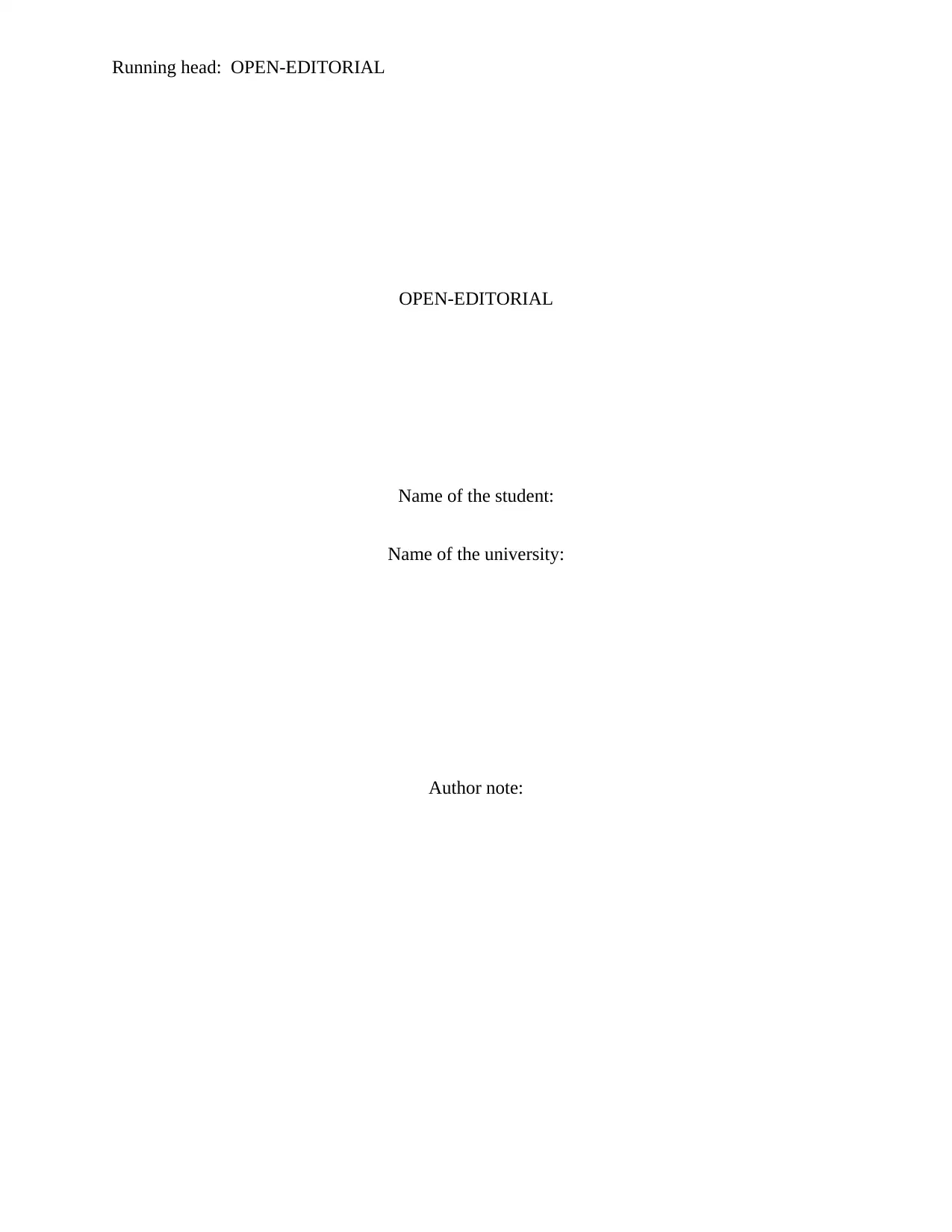
Running head: OPEN-EDITORIAL
OPEN-EDITORIAL
Name of the student:
Name of the university:
Author note:
OPEN-EDITORIAL
Name of the student:
Name of the university:
Author note:
Paraphrase This Document
Need a fresh take? Get an instant paraphrase of this document with our AI Paraphraser
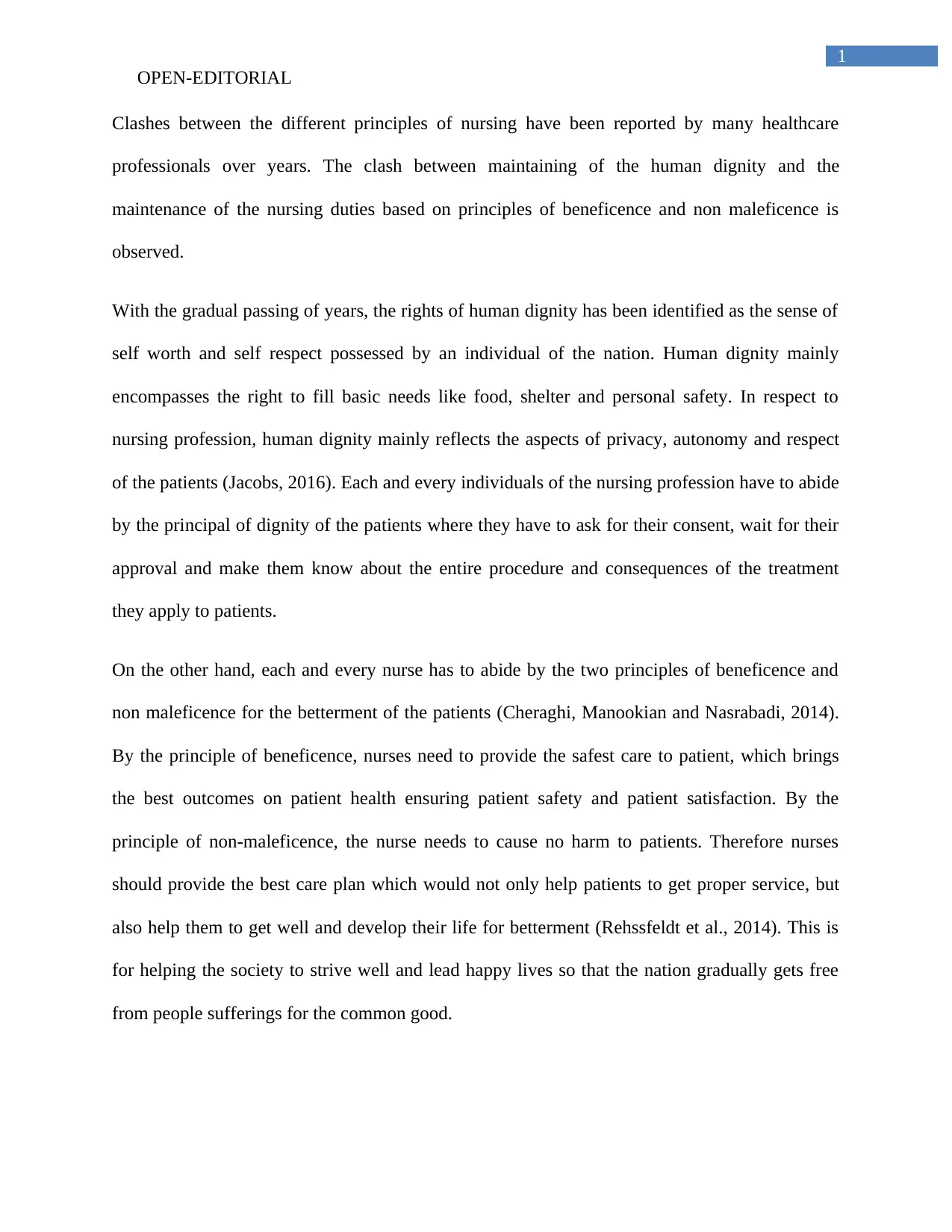
1
OPEN-EDITORIAL
Clashes between the different principles of nursing have been reported by many healthcare
professionals over years. The clash between maintaining of the human dignity and the
maintenance of the nursing duties based on principles of beneficence and non maleficence is
observed.
With the gradual passing of years, the rights of human dignity has been identified as the sense of
self worth and self respect possessed by an individual of the nation. Human dignity mainly
encompasses the right to fill basic needs like food, shelter and personal safety. In respect to
nursing profession, human dignity mainly reflects the aspects of privacy, autonomy and respect
of the patients (Jacobs, 2016). Each and every individuals of the nursing profession have to abide
by the principal of dignity of the patients where they have to ask for their consent, wait for their
approval and make them know about the entire procedure and consequences of the treatment
they apply to patients.
On the other hand, each and every nurse has to abide by the two principles of beneficence and
non maleficence for the betterment of the patients (Cheraghi, Manookian and Nasrabadi, 2014).
By the principle of beneficence, nurses need to provide the safest care to patient, which brings
the best outcomes on patient health ensuring patient safety and patient satisfaction. By the
principle of non-maleficence, the nurse needs to cause no harm to patients. Therefore nurses
should provide the best care plan which would not only help patients to get proper service, but
also help them to get well and develop their life for betterment (Rehssfeldt et al., 2014). This is
for helping the society to strive well and lead happy lives so that the nation gradually gets free
from people sufferings for the common good.
OPEN-EDITORIAL
Clashes between the different principles of nursing have been reported by many healthcare
professionals over years. The clash between maintaining of the human dignity and the
maintenance of the nursing duties based on principles of beneficence and non maleficence is
observed.
With the gradual passing of years, the rights of human dignity has been identified as the sense of
self worth and self respect possessed by an individual of the nation. Human dignity mainly
encompasses the right to fill basic needs like food, shelter and personal safety. In respect to
nursing profession, human dignity mainly reflects the aspects of privacy, autonomy and respect
of the patients (Jacobs, 2016). Each and every individuals of the nursing profession have to abide
by the principal of dignity of the patients where they have to ask for their consent, wait for their
approval and make them know about the entire procedure and consequences of the treatment
they apply to patients.
On the other hand, each and every nurse has to abide by the two principles of beneficence and
non maleficence for the betterment of the patients (Cheraghi, Manookian and Nasrabadi, 2014).
By the principle of beneficence, nurses need to provide the safest care to patient, which brings
the best outcomes on patient health ensuring patient safety and patient satisfaction. By the
principle of non-maleficence, the nurse needs to cause no harm to patients. Therefore nurses
should provide the best care plan which would not only help patients to get proper service, but
also help them to get well and develop their life for betterment (Rehssfeldt et al., 2014). This is
for helping the society to strive well and lead happy lives so that the nation gradually gets free
from people sufferings for the common good.
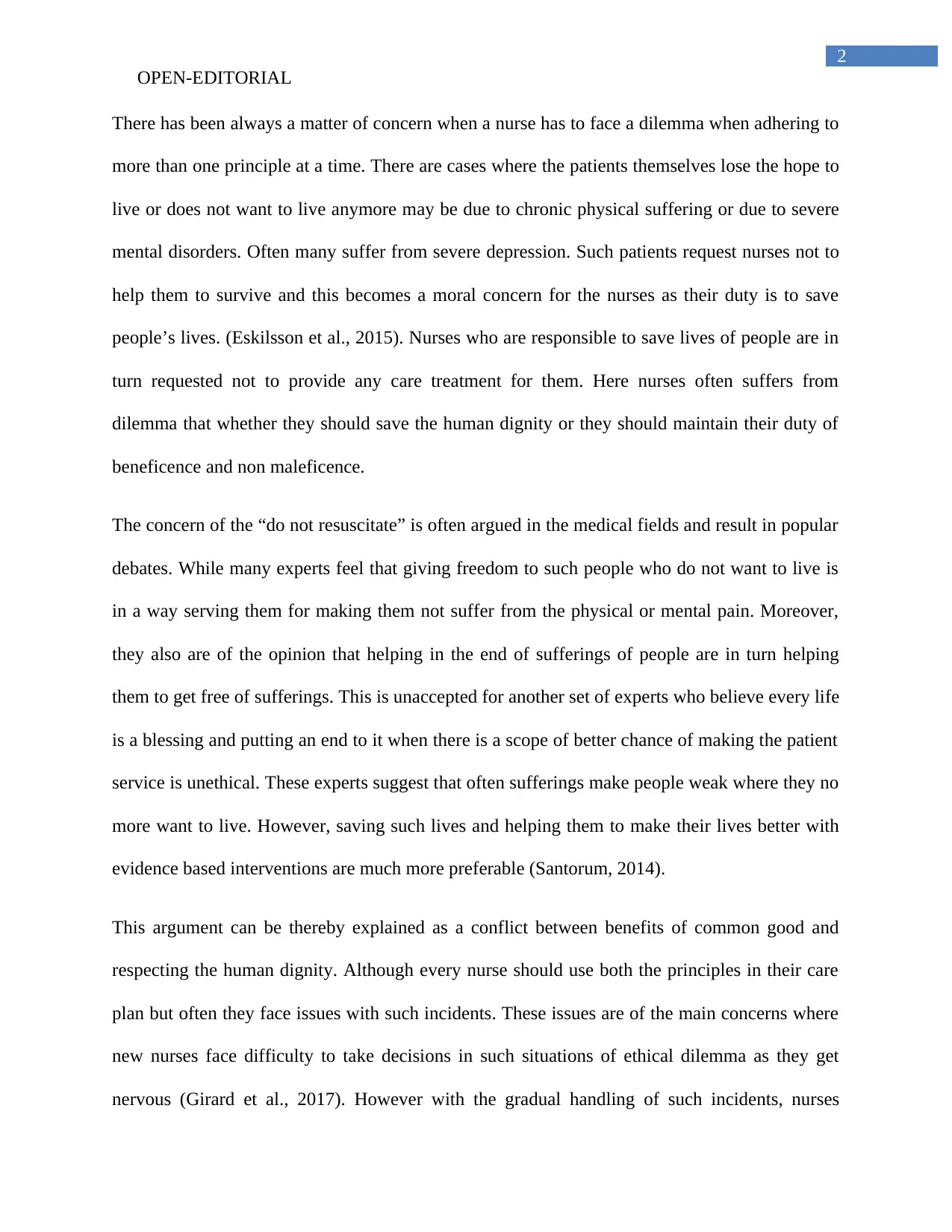
2
OPEN-EDITORIAL
There has been always a matter of concern when a nurse has to face a dilemma when adhering to
more than one principle at a time. There are cases where the patients themselves lose the hope to
live or does not want to live anymore may be due to chronic physical suffering or due to severe
mental disorders. Often many suffer from severe depression. Such patients request nurses not to
help them to survive and this becomes a moral concern for the nurses as their duty is to save
people’s lives. (Eskilsson et al., 2015). Nurses who are responsible to save lives of people are in
turn requested not to provide any care treatment for them. Here nurses often suffers from
dilemma that whether they should save the human dignity or they should maintain their duty of
beneficence and non maleficence.
The concern of the “do not resuscitate” is often argued in the medical fields and result in popular
debates. While many experts feel that giving freedom to such people who do not want to live is
in a way serving them for making them not suffer from the physical or mental pain. Moreover,
they also are of the opinion that helping in the end of sufferings of people are in turn helping
them to get free of sufferings. This is unaccepted for another set of experts who believe every life
is a blessing and putting an end to it when there is a scope of better chance of making the patient
service is unethical. These experts suggest that often sufferings make people weak where they no
more want to live. However, saving such lives and helping them to make their lives better with
evidence based interventions are much more preferable (Santorum, 2014).
This argument can be thereby explained as a conflict between benefits of common good and
respecting the human dignity. Although every nurse should use both the principles in their care
plan but often they face issues with such incidents. These issues are of the main concerns where
new nurses face difficulty to take decisions in such situations of ethical dilemma as they get
nervous (Girard et al., 2017). However with the gradual handling of such incidents, nurses
OPEN-EDITORIAL
There has been always a matter of concern when a nurse has to face a dilemma when adhering to
more than one principle at a time. There are cases where the patients themselves lose the hope to
live or does not want to live anymore may be due to chronic physical suffering or due to severe
mental disorders. Often many suffer from severe depression. Such patients request nurses not to
help them to survive and this becomes a moral concern for the nurses as their duty is to save
people’s lives. (Eskilsson et al., 2015). Nurses who are responsible to save lives of people are in
turn requested not to provide any care treatment for them. Here nurses often suffers from
dilemma that whether they should save the human dignity or they should maintain their duty of
beneficence and non maleficence.
The concern of the “do not resuscitate” is often argued in the medical fields and result in popular
debates. While many experts feel that giving freedom to such people who do not want to live is
in a way serving them for making them not suffer from the physical or mental pain. Moreover,
they also are of the opinion that helping in the end of sufferings of people are in turn helping
them to get free of sufferings. This is unaccepted for another set of experts who believe every life
is a blessing and putting an end to it when there is a scope of better chance of making the patient
service is unethical. These experts suggest that often sufferings make people weak where they no
more want to live. However, saving such lives and helping them to make their lives better with
evidence based interventions are much more preferable (Santorum, 2014).
This argument can be thereby explained as a conflict between benefits of common good and
respecting the human dignity. Although every nurse should use both the principles in their care
plan but often they face issues with such incidents. These issues are of the main concerns where
new nurses face difficulty to take decisions in such situations of ethical dilemma as they get
nervous (Girard et al., 2017). However with the gradual handling of such incidents, nurses
⊘ This is a preview!⊘
Do you want full access?
Subscribe today to unlock all pages.

Trusted by 1+ million students worldwide
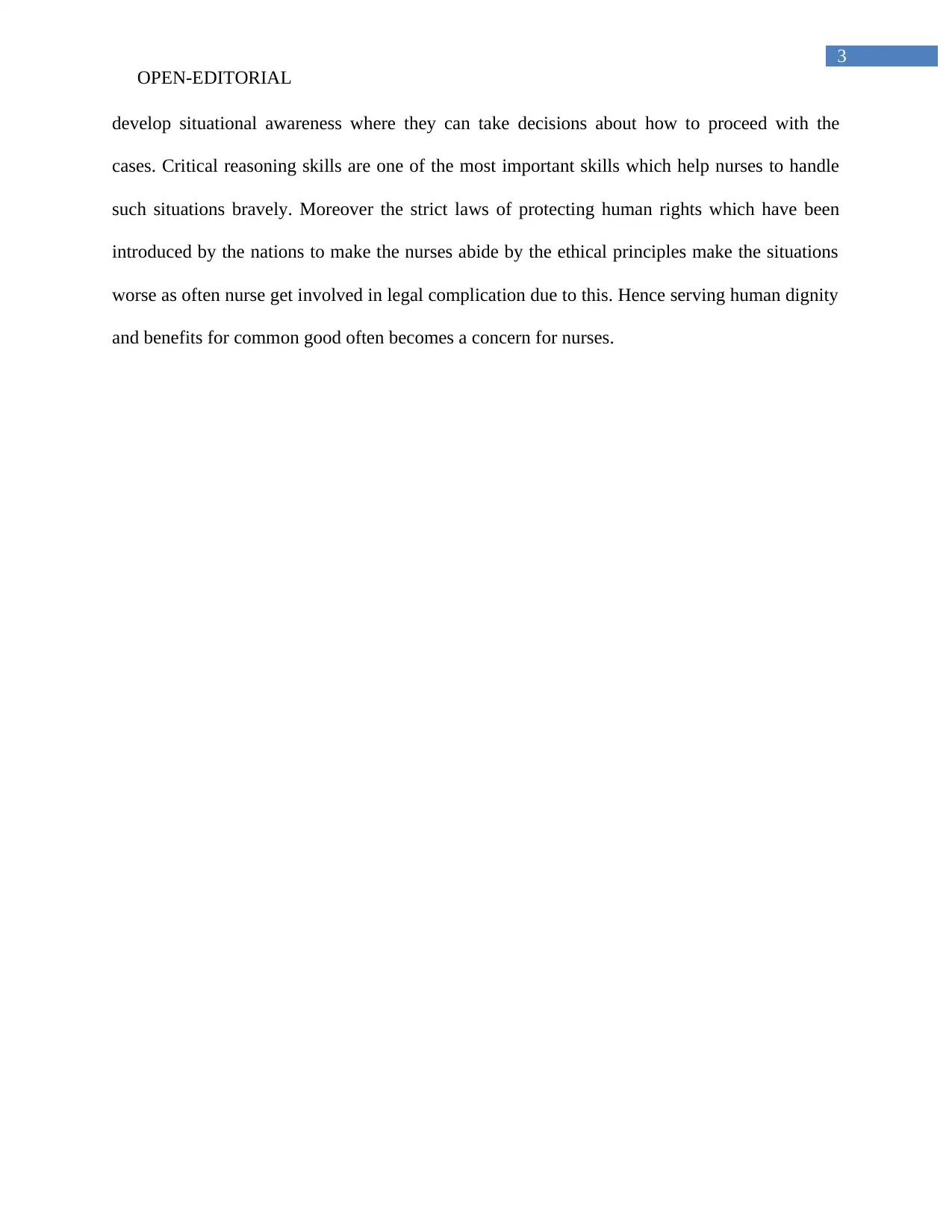
3
OPEN-EDITORIAL
develop situational awareness where they can take decisions about how to proceed with the
cases. Critical reasoning skills are one of the most important skills which help nurses to handle
such situations bravely. Moreover the strict laws of protecting human rights which have been
introduced by the nations to make the nurses abide by the ethical principles make the situations
worse as often nurse get involved in legal complication due to this. Hence serving human dignity
and benefits for common good often becomes a concern for nurses.
OPEN-EDITORIAL
develop situational awareness where they can take decisions about how to proceed with the
cases. Critical reasoning skills are one of the most important skills which help nurses to handle
such situations bravely. Moreover the strict laws of protecting human rights which have been
introduced by the nations to make the nurses abide by the ethical principles make the situations
worse as often nurse get involved in legal complication due to this. Hence serving human dignity
and benefits for common good often becomes a concern for nurses.
Paraphrase This Document
Need a fresh take? Get an instant paraphrase of this document with our AI Paraphraser
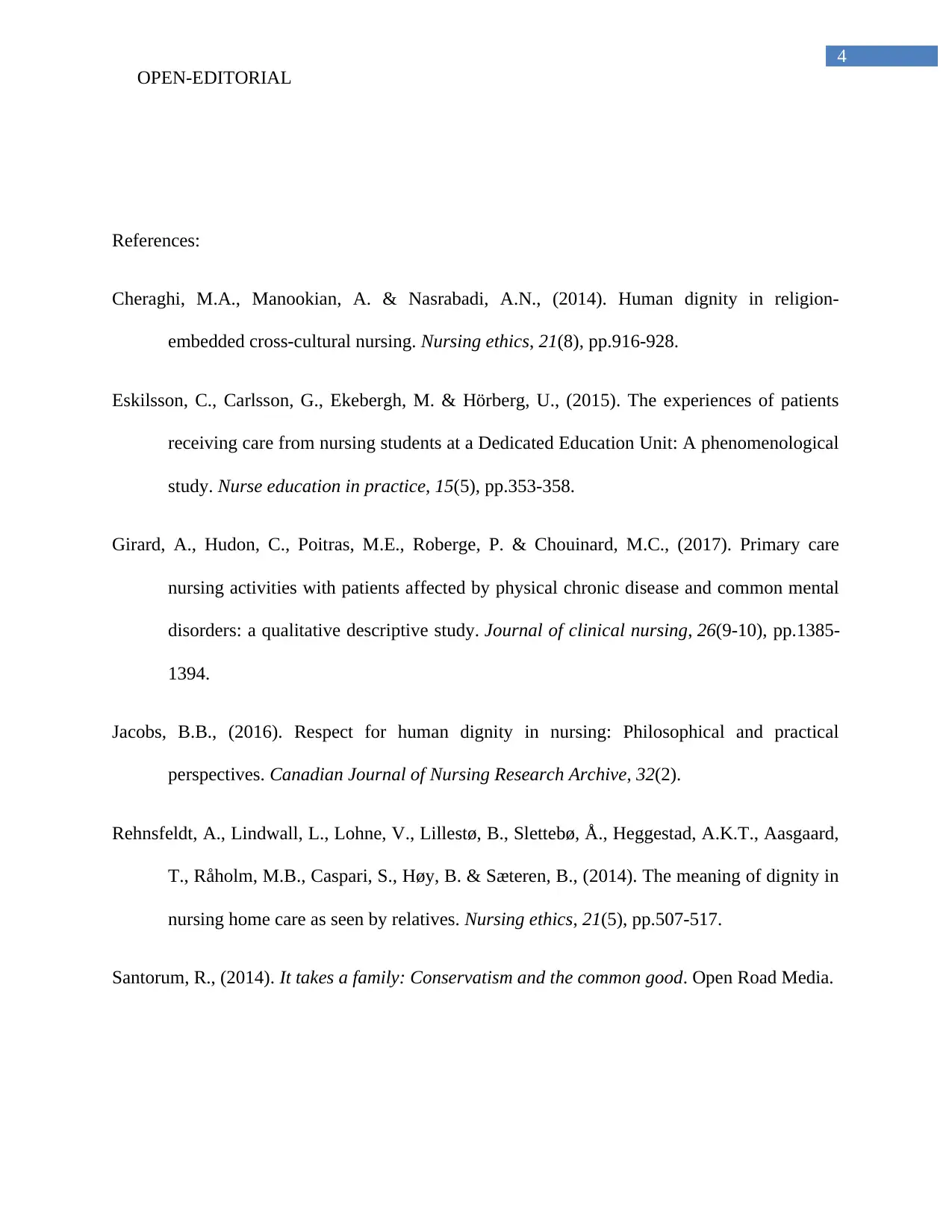
4
OPEN-EDITORIAL
References:
Cheraghi, M.A., Manookian, A. & Nasrabadi, A.N., (2014). Human dignity in religion-
embedded cross-cultural nursing. Nursing ethics, 21(8), pp.916-928.
Eskilsson, C., Carlsson, G., Ekebergh, M. & Hörberg, U., (2015). The experiences of patients
receiving care from nursing students at a Dedicated Education Unit: A phenomenological
study. Nurse education in practice, 15(5), pp.353-358.
Girard, A., Hudon, C., Poitras, M.E., Roberge, P. & Chouinard, M.C., (2017). Primary care
nursing activities with patients affected by physical chronic disease and common mental
disorders: a qualitative descriptive study. Journal of clinical nursing, 26(9-10), pp.1385-
1394.
Jacobs, B.B., (2016). Respect for human dignity in nursing: Philosophical and practical
perspectives. Canadian Journal of Nursing Research Archive, 32(2).
Rehnsfeldt, A., Lindwall, L., Lohne, V., Lillestø, B., Slettebø, Å., Heggestad, A.K.T., Aasgaard,
T., Råholm, M.B., Caspari, S., Høy, B. & Sæteren, B., (2014). The meaning of dignity in
nursing home care as seen by relatives. Nursing ethics, 21(5), pp.507-517.
Santorum, R., (2014). It takes a family: Conservatism and the common good. Open Road Media.
OPEN-EDITORIAL
References:
Cheraghi, M.A., Manookian, A. & Nasrabadi, A.N., (2014). Human dignity in religion-
embedded cross-cultural nursing. Nursing ethics, 21(8), pp.916-928.
Eskilsson, C., Carlsson, G., Ekebergh, M. & Hörberg, U., (2015). The experiences of patients
receiving care from nursing students at a Dedicated Education Unit: A phenomenological
study. Nurse education in practice, 15(5), pp.353-358.
Girard, A., Hudon, C., Poitras, M.E., Roberge, P. & Chouinard, M.C., (2017). Primary care
nursing activities with patients affected by physical chronic disease and common mental
disorders: a qualitative descriptive study. Journal of clinical nursing, 26(9-10), pp.1385-
1394.
Jacobs, B.B., (2016). Respect for human dignity in nursing: Philosophical and practical
perspectives. Canadian Journal of Nursing Research Archive, 32(2).
Rehnsfeldt, A., Lindwall, L., Lohne, V., Lillestø, B., Slettebø, Å., Heggestad, A.K.T., Aasgaard,
T., Råholm, M.B., Caspari, S., Høy, B. & Sæteren, B., (2014). The meaning of dignity in
nursing home care as seen by relatives. Nursing ethics, 21(5), pp.507-517.
Santorum, R., (2014). It takes a family: Conservatism and the common good. Open Road Media.
1 out of 5
Related Documents
Your All-in-One AI-Powered Toolkit for Academic Success.
+13062052269
info@desklib.com
Available 24*7 on WhatsApp / Email
![[object Object]](/_next/static/media/star-bottom.7253800d.svg)
Unlock your academic potential
Copyright © 2020–2026 A2Z Services. All Rights Reserved. Developed and managed by ZUCOL.





